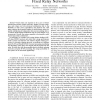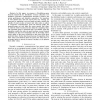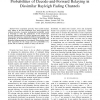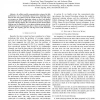108
Voted
GLOBECOM
2008
IEEE
15 years 1 months ago
2008
IEEE
Selection cooperation is proposed for rateless coded relaying by developing a novel low-complexity protocol that exploits all source-destination, source-relay, and relay-destinatio...
115
Voted
CCS
2010
ACM
15 years 1 months ago
2010
ACM
Tor, a distributed Internet anonymizing system, relies on volunteers who run dedicated relays. Other than altruism, these volunteers have no incentive to run relays, causing a lar...
90
Voted
ESA
2008
Springer
15 years 2 months ago
2008
Springer
In the relay placement problem the input is a set of sensors and a number r 1, the communication range of a relay. In the one-tier version of the problem the objective is to place...
107
Voted
GLOBECOM
2006
IEEE
15 years 7 months ago
2006
IEEE
— Fixed relays are expected to be a part of future infrastructure-based wireless networks. Besides coverage extension, such relays can form advanced architectures due to the fle...
127
Voted
GLOBECOM
2006
IEEE
15 years 7 months ago
2006
IEEE
— In this paper, we propose a Stackelberg game theoretic framework for distributive resource allocation over multiuser cooperative communication networks to improve the system pe...
147
Voted
INFOCOM
2007
IEEE
15 years 7 months ago
2007
IEEE
— The performances in cooperative communications depend on careful resource allocation such as relay selection and power control, but traditional centralized resource allocation ...
95
Voted
ICC
2007
IEEE
15 years 7 months ago
2007
IEEE
—User cooperation protocols, where mobile stations relay signals to the final destination, have been proposed for wireless networks. A general mathematical probability model is ...
96
Voted
ICC
2007
IEEE
15 years 7 months ago
2007
IEEE
— In this paper, we consider a 2-hop wireless diversity relay network. We explore transmit power allocation among the source and relays to maximize the received signal to noise r...
68
Voted
ICC
2007
IEEE
15 years 7 months ago
2007
IEEE
— In cellular mobile communication systems, the link performance can be remarkably improved by deploying relays between the base station and the mobile station. In this paper we ...
116
Voted
ICC
2007
IEEE
15 years 7 months ago
2007
IEEE
— Ultra wide band (UWB) ad-hoc networks have attracted much research attention in recent years. This paper proposes and investigates a new distributed cooperative routing strateg...




